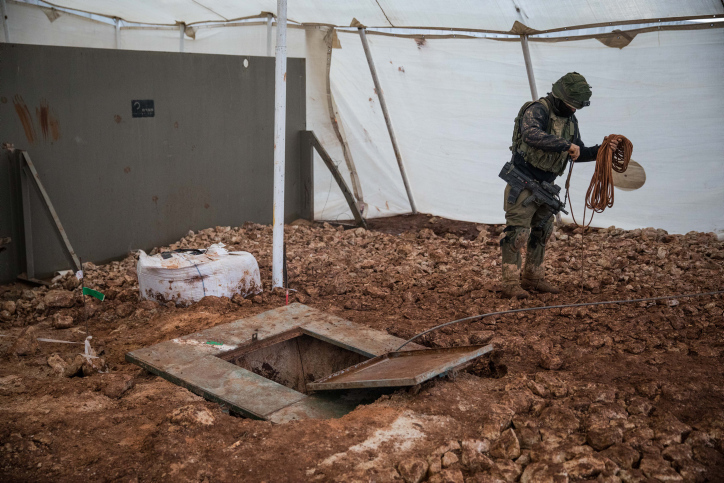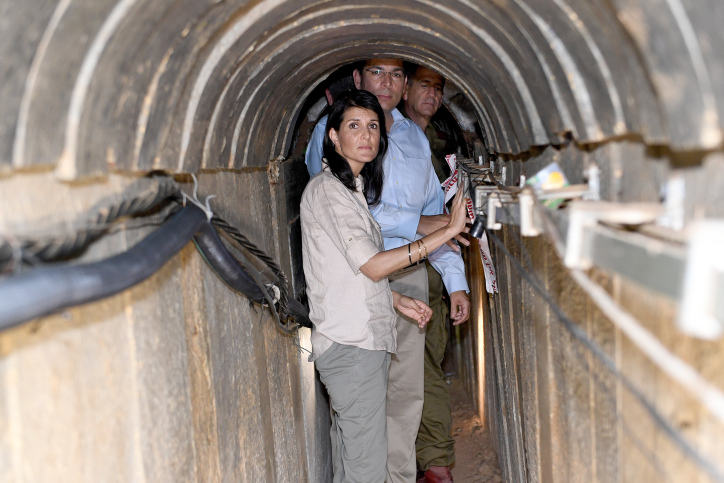“The next war will be urban, dirty, underground,” predicts John Spencer, chair of Urban Warfare Studies and co-director of the Urban Warfare Project at the Modern War Institute at the U.S. Military Academy at West Point.
“We have advanced technology so much that I can strike anybody, anywhere, at any time,” Spencer told Israel Hayom, adding however that such advanced capabilities come with a disadvantage: “Combat has been driven underground, allowing the enemy to hide.”
Earlier this month, experts in various aspects of underground warfare gathered in Israel at the Interdisciplinary Center Herzliya for a conference titled, “Subterranean Challenges in War and Peace,” a joint initiative by the IDC, West Point and the US Embassy in Israel. Experts on warfare and technology, as well as historians and geologists, convened to exchange ideas, with the goal of upgrading military doctrine on underground warfare.
Spencer, a retired infantry major, served in the U.S. Army for 25 years. His tours of duty included Iraq. For the past six years, he has headed West Point’s urban warfare program, training future officers in a field that he believes is becoming the biggest challenge to militaries worldwide.
“Some people would argue that there has been a long history of urban warfare, since ancient times,” he said. “I argue that that’s not true. Militaries have always fought for cities, but not in cities. They tried to avoid fighting in cities at all costs.”
By contrast, he said, “In the last five to 10 years, every conflict has been in a city. You can’t give me a reason why a future conflict won’t be in a city.”
This is even more true of developed countries, said Spencer.
“Over 50 percent of the world’s population lives in urban areas. But if you take a developed country, Europe, the United States, you’re at 80-90 percent,” said Spencer.

Spencer has spent considerable time studying Israel’s counter-terror tactics, including during Israel Defense Forces operations in the Gaza Strip, and believes sufficient attention is not being paid to the lessons emerging from those operations.
“There is a little bit of information available about the lessons learned from Gaza, from ‘Operation Protective Edge.’ I don’t know if it’s resonating with all militaries,” he said.
According to Spencer, militaries usually try to avoid underground warfare. The typical approach, he said, is “bypass it, hope it won’t happen.” But Israel, he said, does not have that luxury.
Despite the enormous rise in the number of battles fought in urban settings and the fact that urban warfare here to stay, Spencer said that the world isn’t devoting enough attention to the matter.
‘You go to Iraq, Syria, you’d better be looking down’
“How wide a view do you take of urban warfare? There’s no course at West Point on urban warfare. We try to incorporate urban ‘lessons,’ and that’s where lessons from ‘Protective Edge’ might be incorporated, but not at the scale I think is necessary,” he said.
That is why, Spencer says, the conference—and the international working group on underground warfare—are so important.
“There’s nobody we could turn to more important than the Israeli military, the Israeli people, to understand how to fight tunnel warfare, from the strategic down to the tactical level. As an urban warfare expert, that’s the most important thing to me. We have a problem training for urban warfare. Underground warfare? Forget it. But the Israeli military has lived with it every day of their lives for a long time. We’re bringing people together so we can start setting up these lessons and sharing information.”
Q: Would you like U.S. officers or future officers to come here to Israel to study? To come see the tunnels, to see the work of our army?
A: “Yes, and I’d like to see attention raised to the problem … to show that this is a bigger problem than people might think. Of course, Israeli people know it’s a problem.”
According to Spencer, the world is largely unaware of the scope of the problem tunnels in urban settings present.
“There were 45 tunnel bombs exploded from 2014-2015 in Syria and Iraq. I was last in Iraq in 2008, and there was nothing. There was ‘underground,’ but not being used as a method of warfare as it is now,” he said.
“If I were in Iraq today, the threat from underground is twenty-fold what it was when I was there. It’s incredible,” he added. “On all my tours in Iraq, I never looked down. You go to Iraq, Syria [today], you’d better be looking down, because that’s a significant threat.”
Q: Do the terrorist organizations talk to each other? Does Hamas talk to Hezbollah?
A: “Absolutely. That diffusion of information, how to do these things, went straight from Israel into Syria. We saw an explosion in tunnels. The passing of information is one of the urban problems—these terrorist organizations start passing [information about] what works to each other.”

Conference host Dr. Daphne Richemond-Barak, an internationally known researcher specializing in tunnel warfare who this year published a book on the subject, titled “Underground Warfare,” agrees with Spencer.
“You can never feel safe. You can never feel secure in any kind of geographical perimeter, because in the end … it can pop up at any time. [The enemy] can pop up behind you or next to you or on you,” she said.
“When you go for the high tech, you have to prepare for the low tech,” said Richemond-Barak. “It doesn’t mean it’s going to be an existential threat to you, but if you don’t prepare for it, it will take you by surprise. In the Israeli context, it’s also explosive balloons and kites. That’s low tech, and it’s also a disruption. It’s a consequence to military superiority.”
The tunnel issue, she said, is a global one.
“We in Israel think that the tunnel issue is an Israeli issue. But the conference demonstrates that this is not an Israeli issue. It’s everywhere—in Mali, in Afghanistan, in Iraq, in Syria. It could come to Europe, as well,” she said.
‘When you go for the high tech, you have to prepare for the low tech’
This is why, she argued, it is so vital to bring global attention to the issue of underground warfare as a global threat.
Moreover, Richemond-Barak thinks that Israel can learn from other countries, too, citing a new underground warfare doctrine published in November by the U.S. military as something Israel should study.
“This is the first time something so comprehensive—and not classified—has been published about preparation, training, etc. Israel also recently put out a maneuver doctrine that the U.S. can learn from, as well,” she said.
Richemond-Barak sees underground warfare as a “great equalizer.” Fighting in tunnels “neutralizes the asymmetry between belligerents in a military conflict,” she said, which is why it is necessary for militaries to combine their existing knowledge of urban warfare with an underground warfare doctrine and use the two together against the enemy.
Spencer added that there is a vast underground network in every city in the world that enemy forces will inevitably use for one purpose or another. In light of that fact, he said, it’s “ridiculous” how little information is available on underground warfare.
“The current doctrines say the underground is ‘high risk’—avoid it at all costs. That is not the world we live in.”
This article first appeared in Israel Hayom.


























